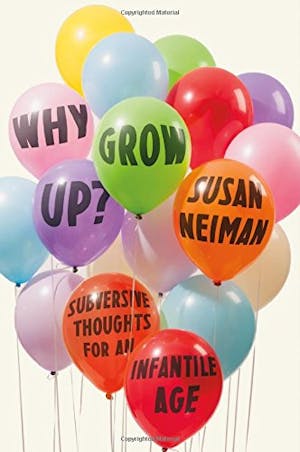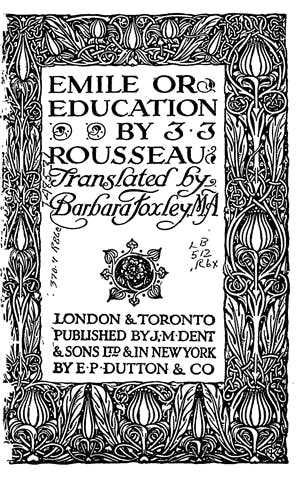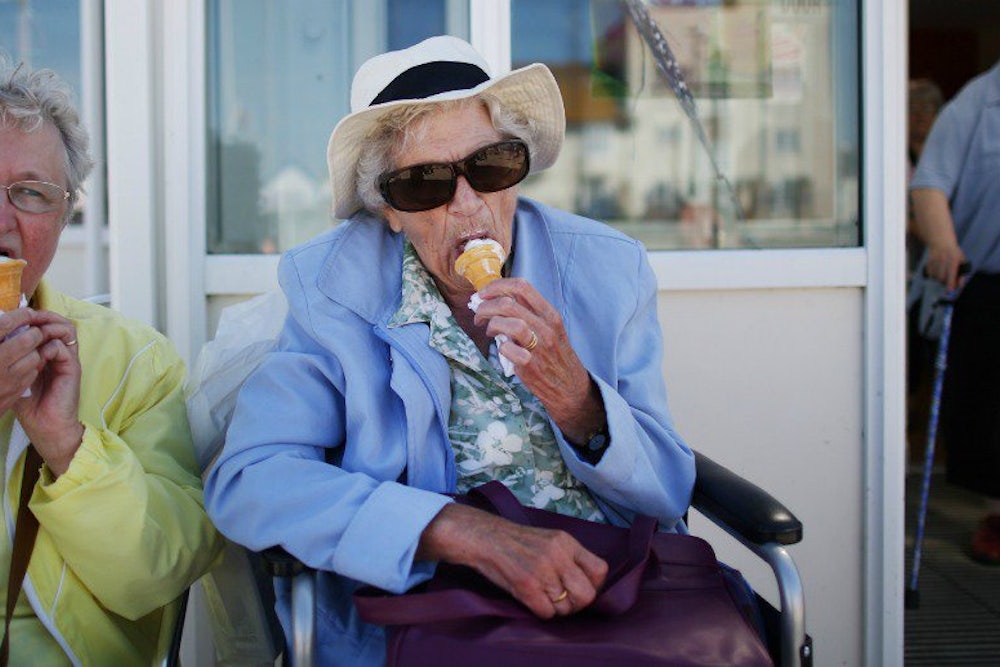Ageism is deeply ingrained in our culture. How often do we assume the older person in our office is incapable of using email—and probably inferior? That baby boomers have a certain value system?

Susan Neiman fights the notion that growing older is a decline in Why Grow Up?: Subversive Thoughts for an Infantile Age. She believes we are living in an “infantile age”—an era in which we idealize childhood for its freedom and imagination and dread the coming of old age. Our entire society has lost track of why we should grow up in the first place—of the value of maturity and independence. Our culture, in fact, breeds dependency in both consumerism and work: smartphones are toys (and we get anxious when we’re away from them); there is a dramatic shortage of meaningful work. Neiman keeps coming back to the image of the ever-child, Peter Pan, as the whimsical figure we all envy.
Getting out of the vicious cycle of immature adults raising children who grow up to be immature is a special challenge, one that Neiman believes we can tackle using philosophy, beginning with Rousseau. The central questions of the book are about what type of education children need in order to reach and value full maturity.
But rather than treating this as a problem of the ages—as the philosophers she looks to do—Neiman pins it on the problems of this century, and makes suggestions as to how we can, in our daily lives, fights dependency. Neiman knows that the individual can’t do much, but thinks we should do what we can to reclaim our lives, to work toward being free people.
In an attempt to come up with a theory of education, Rousseau did much to invent the idea of childhood. Rousseau was trying to imagine what conditions would create an ideal citizen, one who grew up outside of corrupt society: a citizen without a village. This was, indeed, the problem of the Enlightenment, to figure out the relationship between individuals and the state and how men could be free. (“Men must be forced to be free” he wrote in The Social Contract.)
In his treatise on education, Emile, Rousseau describes the childhood that would produce such an unfettered citizen. When we’re born, the world seems just as it should be, and our every need is taken care of by our parents. But as you grow up, what the world is and what the world should be begin to split. This happens in a basic way as we first experience hunger or the pain of teething, or bump into tables or trip on the sidewalk. This gap—between what is and what ought to be, between nature and reason—expands as we grow older.

Rousseau’s idealized child, Emile, would grow up without the conflict between is and ought, without dependency on society, and without culture (which makes us dependent). The child would be insulated from culture until his teens and would know no man-made limits. Emile was accompanied by an all-seeing tutor, who would guide his learning, Montessori-style, following the child’s interests and needs. “His astronomy lesson takes place in the forest” Neiman writes, “where his tutor has taken him at twilight; Emily is hungry, and needs to learn the position of the stars to guide his way back home.” Emile is trained, too, not to be afraid.
Neiman then shifts to Kant, who was an avid admirer of Rousseau, though they led radically different lives. Rousseau travelled constantly while Kant never left his hometown. Kant read Emile with great interest, but believed that the only figure who could truly fulfill Rousseau’s idea of an all-seeing tutor-guardian was God. In line with the rest of Kant’s metaphysical project, the counterpart of God in the heavens above is the naturally occurring moral law within oneself. So, using God as his guide, Kant focuses on attaining enough self-discipline and autonomy to develop the capacity to obey one’s own law under his naturally occurring morality. Kant took a more realistic view of education: Teachers should not always endeavor to break their students’ wills. But Kant agrees with Rousseau on the difficulty of achieving this at a societal level: Rousseau himself fathered five children, all of whom were sent to the orphanage and “Kant thought that good education must be the work of generations” Nieman writes.
A large part of growing up, for these philosophers, is to eliminate fear and bring desire under control, because fear springs from ignorance, and desire breeds non-freedom: “Freedom cannot simply mean doing whatever strikes you at the moment; that way you’re a slave to any whim or passing fancy,” Nieman writes. “Real freedom involves control over your life as a whole, learning to make plans and promises and decisions, to take responsibility for your actions’ consequences. How is the child to learn if, like Peter Pan, he is ruled by the successive play of desires?”
In lieu of dramatic societal change, Neiman’s solution to the epidemic of childishness is for people to take their maturity into their own hands, and expose themselves to challenging, foundational experiences. She recommends we put ourselves in situations that open our worldview to different societies and different ways of being. And her advice is concrete—she says, for instance, that everyone should spend a week off the Internet. She also encourages the reader to travel, but not in the typical American way, in which semesters abroad are isolated experiences where no one forces you to speak anything but English. No, traveling is best accompanied by work.
The book offers a lot of good writing on the history of theories of education, but it would have done well to stick with that. In Neiman’s prescription for how to grow up, it becomes clear she’s only talking to a select few: the privileged. When Neiman suggests we all travel in a meaningful way, she assures us it doesn’t need to cost much if we go and work on a farm somewhere. But for the majority of people, it’s not as simple as that: What if you have a family and need to raise your kids? What if leaving work for a month costs you your job? What if you can’t pay for a plane ticket or a passport? The idea that people have all the materials to help themselves within the free market, without the help of social infrastructure and safety nets, is reminiscent of the worst policies of the twentieth century.
The theme that lurks below the surface of Why Grow Up? is a critique not of society in general but of life under capitalism. Citing Arendt, Neiman pines for engaging, meaningful work that allows us to leave our mark on the world; she harkens back to criticisms of devalued labor going back to Marx. One of the best passages in the book relates to planned obsolescence: the way in which products become outdated before they need to. The prime example is the light bulb, whose hours of illumination were intentionally decreased in the early twentieth century so that light bulb companies could sell more. While she connects this high-turnover cycle to retirement—the planned obsolescence of people—she doesn’t call it what it is: capitalism.
The paradox that keeps coming back is that it’s impossible to create responsible citizens without an enriching society, but it’s impossible to create that society without having the responsible citizens. Neiman’s focus on the Enlightenment necessitates that the solution be individualistic, but it’s frustrating that Neiman locates the solution in individualism rather than collective action. Neiman never entertains the idea that, rather than fixing each one of us until there’s some critical mass of educated, free adults to overturn the entire system, that there’s something inherent in the system itself that needs to be changed. Why turn to our personal will to fight dependency on products, when everywhere we turn there’s an advertisement?
Yet collective action is right under her nose. Though she quotes Arendt at length and explains Arendt’s distinction between labor and work (activity to survive versus activity to create lasting things), she doesn’t draw out Arendt’s third point, “action.” “Action, in so far as it engages in founding and preserving political bodies,” writes Arendt, “creates the condition for remembrance, that is, for history.” We can’t be remembered, we can’t have history, unless we have people making meaningful things. You can’t have a meaningful life—without a way to make a meaningful imprint on the world.
Nevertheless, I find Neiman’s paradigm for thinking about what it means to grow up—the yawning gap between what the world should be and what the world is—useful for thinking about current debates. In the ongoing debate over trigger warnings, professors tend to take Neiman’s perspective that their students are resistant to challenge and to growing up. Professors feel their job is, in some ways, to pry open this gap, especially for their more privileged students. For their part, the students are looking for some acknowledgement that their “is” and “ought” were pried apart long ago. The professors feel this is an assault on free speech from the standpoint of political correctness, and the students feel the problem is generational.
In her worst moments, Neiman sounds like a cheerleader for intellectualism: She defends reading Kant as, yes, boring, but "it can enlarge your mind!" Her first piece of advice for growing up is to “Avoid places where you are the smartest person in the room.” These maxims are, to say the least, extremely limited as advice. Being the smartest person in the room is problem that suggests more about the ego than the need for new, challenging experience.
Being an adult is a right that we afford everyone at a certain age. Growing up, as Neiman points out, is about experience and judgment. And experience and better judgment are inevitable as people learn from their mistakes. We don’t need to be convinced to grow up because we do, no matter what.
